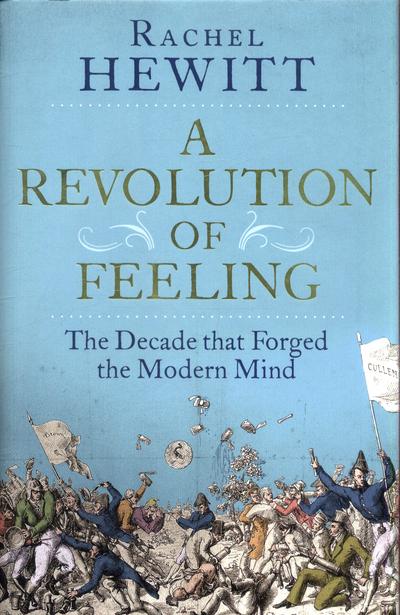The less tangible the object, the harder it is to study its history – and when that object is not an object at all, but a feeling, the situation becomes even worse. We can learn what previous generations wore, and wrote, and made, and built, and ate. We can even learn what they thought, and how they thought about it, if such musings were recorded. But can we ever really feel the past – to know what it was like to be alive at a certain time? And more than this – can we ever know how they processed their own feelings – how important or useless they considered anger, pride, melancholy, joy, despair?
Lecturer, writer and broadcaster Rachel Hewitt has written A Revolution of Feeling – an exploration of Britain & Europe in the 1790’s, and how the decade interpreted and reimagined human emotions, and their importance to an ideal society. She argues that the initial optimism surrounding the French Revolution from British radicals – that a new world and way of living were possible – gave way to a far more negative outlook, shaped by the Terror, the additional violent backlashes, and the decades of war that followed.
It is a wide-ranging and fascinating argument, taking in key figures of the age (Wollstonecraft, Coleridge, Thomas Wedgewood and others), and exploring their impassioned, sometimes wrong-headed and bizarre adventures (such as the attempted set-up of a utopian society in Tahiti, with the included presence of Tahitian slaves – sexual slavery for the women, manual for the men). Hewitt argues that the decade shaped our modern emotional landscape.
The ideas are just as compelling in person as they are on paper, with Hewitt coming across as articulate, informed and hugely passionate about her latest publication. Talk ranges over the different meanings of sentiment, sensibility and emotion, with the latter (during the period) often only used or referred to in a more medical or psychological context. Hewitt mentions how, if emotions were seen as having a purpose, it was to act as the glue that held together a healthy society. She segues this nicely into an anecdote about the importance of semen – or rather, the greater importance of it’s regular release, as being something that was considered emotionally healthy for men.
Disappointingly, the well-heeled book festival audience fails to raise a laugh at this, though Hewitt’s next point makes this just as well. She argues with great conviction that we still refer to emotions – particularly male emotions – as a form of pressure release (to flip your lid, to vent, to let off steam – all idioms still in use). That, to an extent, we accept that men cannot control their emotions, and that these emotions will, inevitably, burst out at some point or other, with predictably violent results – and crucially, that this is expected, accepted and forgiven. An irrational woman is still just that – irrational. An irrational man – including one who may have killed his own family – is evil, but often understandably so – reports of these crimes often talk about the ‘pressures’ faced, or look for mitigating circumstances – as if any amount of unhappiness in a relationship could be offered as an adequate excuse.
It’s a darker note to conclude on before questions are thrown open to the audience, and an important consideration – attitudes from the past, less obviously ugly than the usual suspects (slavery, the subjugation of women, class inequality), can still have an impact, centuries down the line. Hewitt argues against a blanket and ingrained acceptance of how we think about emotions as being just ‘how they are’ – rather than how they have been treated, considered and interpreted in a decade that had lost radical hope for the future. It’s something to think about and feel, in equal measure.
